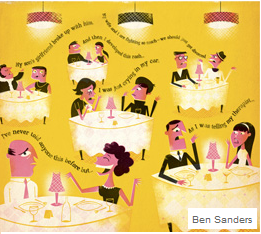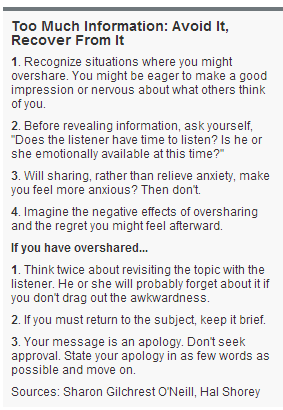As a blogger, I may inherently overshare my thoughts and opinions. If I were being totally honest, I would say that I tend to overshare “in real life” and I sometimes wish I could “take things back”. I loved this article (and video) in the Wall Street Journal on “What Makes People Overshare” by Elizabeth Bernstein. I also loved the helpful tips so read on!
“Ever share too much information—and you weren’t even tipsy? I call it BYB—Blabbing Your Business. It’s happening a lot these days thanks to reality TV and social media sites, where it’s perfectly normal for people to share every single detail of their lives, no matter how mundane or personal. In the culture we live in, it’s hard to remember that some things should be private.
It isn’t all Facebook’s fault. Experts say oversharing often happens when we are trying subconsciously to control our own anxiety. This effort is known as “self regulation” and here is how it works: When having a conversation, we can use up a lot of mental energy trying to manage the other person’s impression of us. We try to look smart, witty and interesting, but the effort required to do this leaves less brain power to filter what we say and to whom.
This explains why people often blurt out embarrassing things to precisely the people they want to impress most, whether it’s the boss, a first date or a future in-law.
Consider this scenario: Your boss walks by and doesn’t make eye contact. You feel uneasy and think of something you need to discuss with him or her. “If you are psychologically aware, you will realize you are feeling anxious and picking up rejection cues,” says Hal Shorey, a psychologist and assistant professor for the Institute for Graduate Clinical Psychology at Widener University in Chester, Pa. “You’re trying to reestablish connection.”
Does this work? Of course not. We often regret our disclosures, feel like an idiot—and then worry even more about what the listener is thinking. We may feel compelled to “fix” the situation, leading to—you guessed it—even more blabbing. It’s a cruel downward spiral.”
I do think that social media makes this problem worse or maybe just magnifies it. Don’t you? Check out this article and infographic on “Are People Sharing Too Much Online?” This portion of the infographic fits well with the WSJ article:

There is more on personality types and “attachment styles” in the WSJ article and I agree that some people are much more likely to overshare than others. It will come as no surprise that people who have an “anxious attachment style” are more apt to overshare. After describing these, The author continues: [highlights mine]
“Of course, we all have our own bursting point, when under emotional stress we can no longer contain ourselves, says Sharon Gilchrest O’Neill, a Mount Kisco, N.Y., marriage and family therapist. “They think, ‘Oh God, does that feel good to talk,’ ” she says. “But they’re definitely not thinking of the other person and this may hurt their relationship.”
The real trouble starts when you share information that isn’t really yours to share. In her therapy practice, Ms. O’Neill says she regularly sees people who tell someone about their own marital problems, or a divorce or separation before it actually happens. Another common scenario involves mothers sharing information about their daughters. In all these cases, she says, “it usually comes back to haunt them.”
So how do you stop yourself from blabbing too much? Do what your mother said: Stop and think before you open your mouth. “Go through the process in your mind where you walk through the ultimate effects of sharing,” Ms. O’Neill says.
These are specific questions you should ask yourself, Dr. Shorey says. “Does my listener have time right now—and is he or she emotionally available to listen?” “Will your blabbing relieve your anxiety—or make it worse?” “In other words,” Dr. Shorey says, “you can probably anticipate worrying that your boss will think you’re an idiot for oversharing if you just take the time to think about it.”
If you should find that you said too much, how do you recover? Most people think it’s a good idea to go back and apologize. Most often, though, it isn’t. “When I work with people in my office, I try to help them think through what the consequences will be,” Ms. O’Neill says. “Will there be a boomerang effect?”
Ah, if only we could all remember to ask ourselves these questions a/k/a think before we speak! I love this set of tips for avoiding and recovering from the dreaded overshare:
I especially like the reminder to “keep it brief” if you apologize. It can just be a big hole opening up – right? I need a set of tips for dealing with oversharers, too. I have a few in my life and sometimes I want to erase my brain’s tape of the TMI!
For a counterpoint, check out In Defense of Sharing a Little Too Much Information by Jen Doll from the Atlantic. I think there is some truth to her side of the story, too. She says:
“There is a fine line between sharing (widely, even universally considered good) and oversharing (widely, even universally considered bad). Some of what the world dubs an “overshare,” I might just call “fun stuff to talk about over drinks with friends.” And I’d contend that far worse than the much-decried overshare is the undershare. It is more insidious than its predecessor for numerous reasons. One, because we get nothing from it. It is both uninteresting and highly unsatisfying to live in an utterly polite perfect society in which no one says anything that bothers anyone else, not least because someone is always going to be bothered. Oversharing, too, does the service of giving people things to rail against, to enjoy, to learn from, to feel better about themselves with. And there are people who make their livings based on oversharing, or on pointing out someone else’s oversharing (see STFU Parents, a valuable example of the former). Where would the economy, and our enjoyment levels, be without it? “
Ah, the “I’m OK, look at these train wrecks” argument always gets some points with me. In fact, there is a whole website dedicated to embarrassing social media overshares. Who knew?
What do you think? How do you deal with overshares and over-sharers in your life?
PS. Don’t forget to check out my awesome $100 Home Depot card give away!




